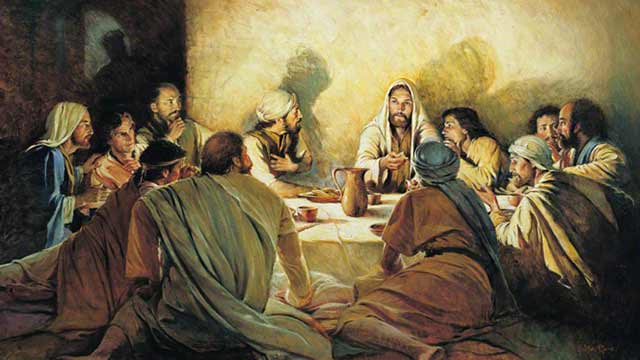It’s Maundy Thursday, the first Special Liturgy of Holy Week, where we go to the last supper and (according to John) encounter the commandment to love one another. Traditionally the last supper was thought to be a Passover Seder (but likely not) and many congregations, in order to connect themselves more closely to the experience of Jesus and the disciples, will be holding their own Seders tonight.
There are also those who see in Christian Seders a kind of supersessionist appropriation of another people’s religious traditions that continues the Church’s long history of anti-Semitism. Over the years, the Café has offered reflections and opinions on this practice, from denunciation to offering resources. Below are our stories:
Say No to Christian Seders
2010 – Ann Fontaine
As Holy Week nears I see church bulletins and websites publicizing liturgies and events, welcoming others to come and participate. One of the more popular offerings is a Seder. As soon as I see this, I remember a student colleague from divinity school saying, “Why do you Christians steal our sacred rites? You have not suffered as we have suffered at your hands, yet you feel free to take our liturgies for your pleasure.”
Parish Seders: A Resource
2011-Ann Fontaine interview with Meredith Gould
A year ago I wrote an essay for the Episcopal Café, Say No to Christian Seders, outlining why I opposed these events. When I saw a friend’s note on Facebook announcing Meredith Gould’s Come to the Table: A Passover Seder for Parish Use, I retorted with my usual negative comment on the practice of holding seders in Christian Churches. Being a good friend, he asked if I had read it. Then the author joined the conversation and intrigued me with her ideas. While I am still not convinced, the following is an interview with Meredith Gould, who answers many of the questions about her book and the issue of seders in Christian churches. I do recommend it for those who wish to explore the issue and perhaps hold a type of seder that might be appropriate in a Christian church. From the book’s web site the author, “invites faithful, curious Christians to appreciate the Last Supper as a Last Seder for Jesus and his disciples.”
Passover begins with interfaith Seders
2011 – Ann Fontaine
In Newtown, CT more than 140 worshippers attended an interfaith Passover seder at Congregation Adath Israel:
Presiding over the seder were Rabbi Shaul Praver of Congregation Adath Israel, Monsignor Robert Weiss from St. Rose of Lima Roman Catholic Church, Reverend Mel Kawakami of Newtown United Methodist Church, Reverend Leo McIlrath, Coordinator of Corpus Christi: An Ecumenical Catholic Faith Community, Reverend Kathleen Adams-Shepherd of Trinity Episcopal Church and Reverend Matt Crebbin of Newtown Congregational Church.
… Donna Monteleone Randle, coordinator of the event, missed the ecumenical gatherings she had experienced when she lived in New Jersey and wanted to start something similar in Newtown. “I thought it would be something fun to do for the town — something for (religious groups) in the town to do together,” she said.
The trouble with Christian Seders
2014 – Theresa Johnson
Episcopal Cafe blogger Ann Fontaine is not alone in questioning whether it is appropriate for Christian congregations to hold Seders during Holy Week. J. Mary Luti, a retired seminary professor and pastor in the United Church of Christ, is troubled by the idea also. She writes:
There is a danger that in a well-intentioned attempt to honor the church’s Jewish origins, and (we think) do what Jesus did that night, we may end up caricaturing the Jewish ritual we claim to honor. It can be a kind of pious play-acting that is a very far cry from the profound communal anamnesis that is proper to “this night unlike any other night.” Only Jews can experience Passover in such a way that those who ate in haste and fled the Egyptians through the Sea have no spiritual advantage over those who sit at the Seder table today.
Should Christians Hold Seders?
2016 – Andrew Gerns
Every Holy Week and Passover, the question comes up, “Should Christians hold Seders?”
Many Christians think holding a Seder increases their understanding of Jesus’ Jewishness and the Jewish roots of Christianity. Others believe that Christians holding a Seder, especially when they Christianize it, does violence to another religion’s traditions.

